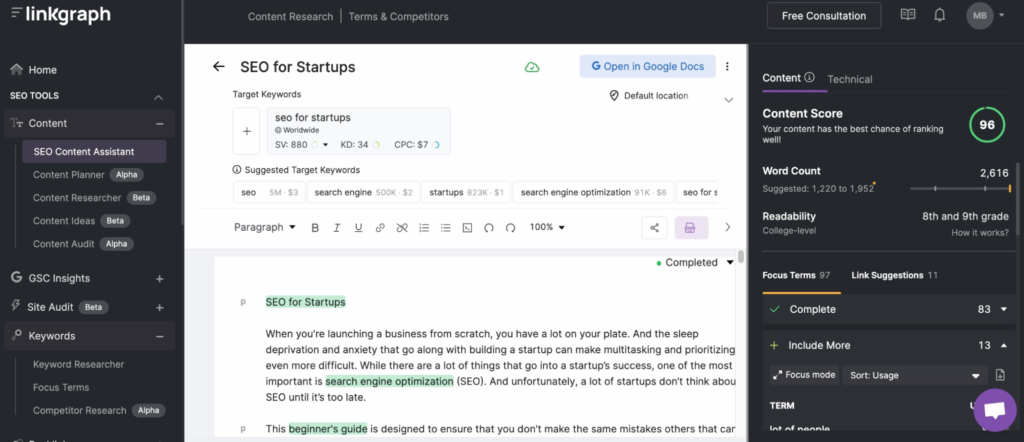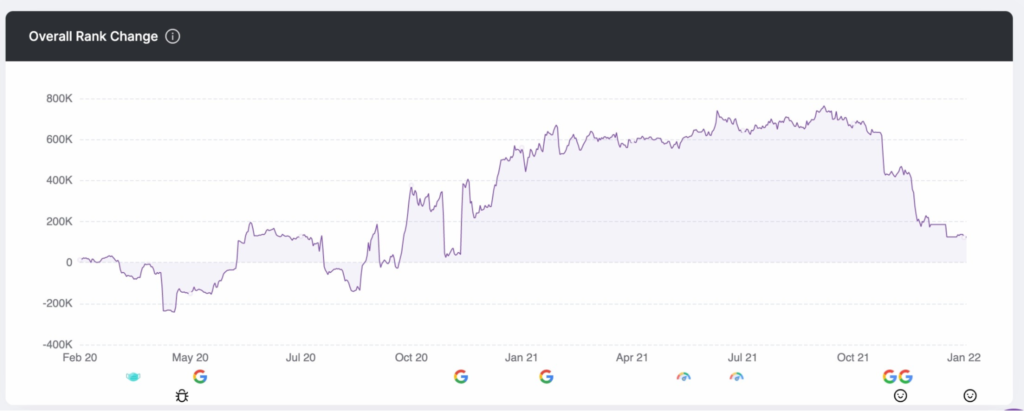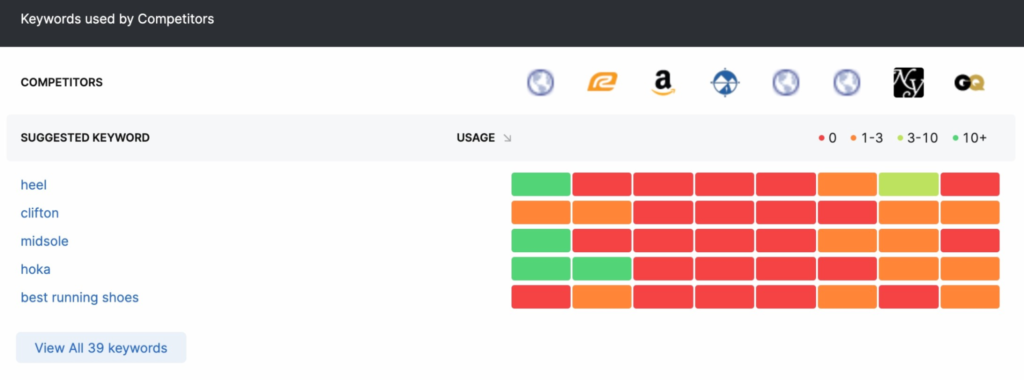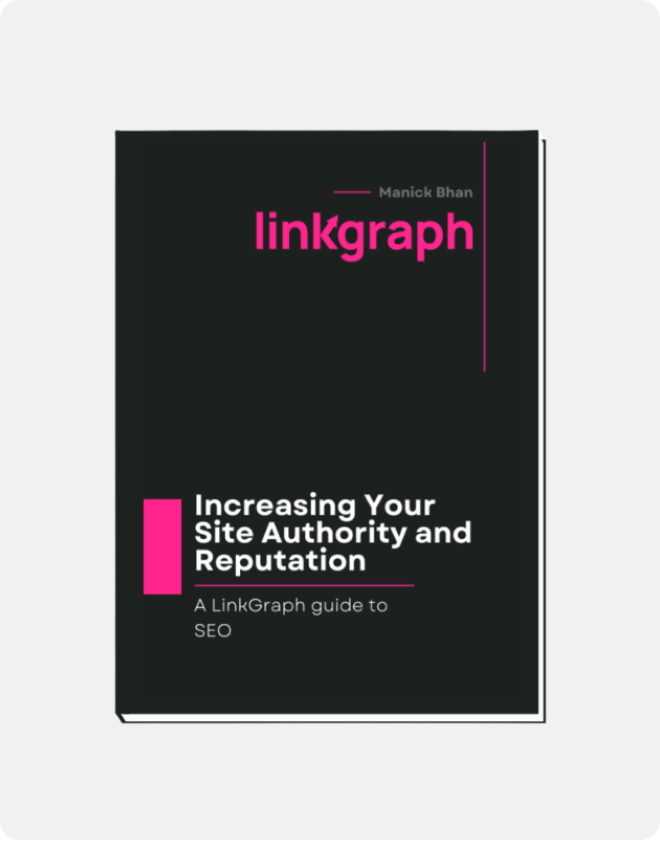A Complete Guide to SEO for Startups
When you’re launching a business from the ground up, you have a lot on your plate. And the sleep deprivation and anxiety that go along with building […]
When you’re launching a business from the ground up, you have a lot on your plate. And the sleep deprivation and anxiety that go along with building a startup can make multitasking and prioritizing even more difficult. While there are a lot of things that go into a startup’s success, one of the most important is search engine optimization (SEO). And unfortunately, a lot of startups don’t think about SEO until it’s too late.
This beginner’s guide is designed to ensure that you don’t make the same mistakes others that came before you have. From SaaS SEO to understanding how to win high-quality backlinks, you will know exactly where your startup is at in your SEO journey and where to go.
And if you need guidance on your startup SEO strategy, or want to pursue a manged campaign for your startup, learn more about LinkGraph’s startup SEO services.
Do Startups Need SEO?
Yes, in most cases, startups do need SEO in order to compete with more established businesses. Without search engine optimization, potential customers may never have the opportunity to discover your startup’s website.
If you are a startup, it is important to invest in SEO in order to compete with more established businesses. SEO can help you achieve higher website traffic and conversions, which can help you grow your business.
What Exactly Is Search Engine Optimization?
Search engine optimization or SEO is a process of optimizing your website and its content to rank higher in search engine results pages (SERPs). The result of successful SEO is an increase in your site’s organic search traffic.
While there are many different aspects that go into search engine optimization, the most prominent methods include optimizing your website’s architecture, keyword research and accompanying pieces of content, and link building.
When done correctly, SEO can help you achieve better brand recognition, higher website traffic, and increased conversions Which gets us to the idea of “doing it correctly.”
How Can SEO for Startups Help You Achieve Your Business Goals?
There’s no question that effective search engine optimization can help you achieve your business goals. By improving your website’s SERP ranking, you can attract more visitors to your site, which can result in more leads and sales.
What’s more, one of the biggest benefits of SEO is it can help you improve the quality of your website’s traffic. By targeting users who are likely to be interested in your products or services, you can increase the likelihood that they’ll convert into customers.
In addition, the results of your SEO strategy can also help you build a stronger online presence for your business. By increasing the visibility of your website and content, you can make it easier for potential customers to find and learn more about your business.
The Basics of Search Engine Optimization for New Startups
SEO is complex and ongoing. So, summing it all up into a one-size-fits-all solid SEO strategy with just a few sentences would be nearly impossible. (And let’s be clear–the intricacy of SEO is what keeps businesses like ours thriving). However, lots of startup entrepreneurs find that beginning with the fundamentals is a great approach.
So, here they are–these are the most important building blocks to improving your SEO:
- Optimize your meta tags with SEO best practices. This includes optimizing your titles, meta descriptions, and header tags.
- Publish high-quality content. High-quality content with target keywords will help you rank higher in SERPs and attract more website visitors.
- Build backlinks. Backlinks are links from other websites to your website. How many do you need? There is no perfect number of links, but, generally speaking, the more backlinks you have, the higher your website will rank in SERPs.
- Optimize your website for mobile users, especially if your startup specializes in mobile app development (imagine the irony). More and more people are using mobile devices to search for information, so it’s important to make sure your website is optimized for mobile.
- Use keywords in your content. Keywords are words and phrases that people use to search for information. By including keywords in your content, you can improve your SEO. But avoid keyword stuffing–this compromises the search engine rankings of your website and can get you in trouble with Google.
If you’re thinking, “So, that’s it?!” The answer is “No.” SEO is a complex topic. These are just general fundamentals, but these tips should help set you up for SEO success as your startup grows.
Diving Deeper: What Are the Best Practices for a Startup SEO Strategy?
SEO for startups can be tricky. You want to make sure you are using the right techniques to improve your site’s ranking from pre-launch and beyond for best results.
Here are a few tips for improving your SEO for startups:
1. Use keywords wisely.
When you are choosing keywords for your site, make sure you are using keywords that are relevant to your business and that people are likely to search for. However, don’t use too many keywords or your site will seem spammy.
You want to make sure you are using the right keywords, but you don’t want to overdo it and make your site seem spammy. This is made even more challenging if you’re defining a new niche in the market–since you’d almost need to be psychic to understand exactly what your searchers would be psychic to predict the combination of search terms your future customers may type into Google.
After you’ve put together a list of keywords, you will want to consider searcher intent for each keyword in order to capture searchers at every level of your sales funnels. This also ensures that your content receives the right kind of traffic while preventing a high bounce rate.
When it comes time to create content, you will want to use a strategic approach to your keyword placement, internal linking, outbound links, and semantically related Focus Terms (which Google uses for latent semantic indexing). A tool like the SEO Content Assistant can guide you through most of this.
Keep in mind most SEO experts suggest that you include a CTA at the end of your blogs to keep users on your site longer (and even direct them. to your sales pages).
Use your keywords in your titles, meta descriptions, and several times throughout a piece. This can increase your click-through-rate (CTR) (number of visitors from the SERPs) and boost your site’s rankings.
2. Increase your site’s traffic through social media marketing.
The more traffic you have, the higher your site will rank in search engine results pages. You can increase your traffic by promoting your site on your own social media accounts and through influencers in your industry.
Influencer marketing tends to have a major impact on getting new startups noticed while driving a good amount of traffic to their sites.
3. Build your backlinks.
Backlinks are links from other websites that lead back to your site. The more backlinks you have, the higher your site’s ranking will be. You can get backlinks by submitting your site to reputable directories, guest blogging, and hiring a digital marketing consultant that has access to backlink opportunities in your niche.
One strategy that tends to work well is offering sites with high domain authorities custom infographics. Why? Infographics are a highly consumed type of content that shows up in Google image searches, but also keeps a viewer’s attention longer than a standard image (increasing time-on-page).
You can also take the Help a Reporter Out (HARO) approach. HARO is where you offer a journalist a pre-written press release about your company that they just need to add the final touches to and submit for publication.
No matter which approaches you find works best for you, be sure to always ask if the site that will be linking to your site uses nofollow links or dofollow links. Nofollow links will likely not pass along the value of a backlink from the other site. While nofollow links will increase your traffic, they will not help a low domain authority.
4. Keep your site updated.
For most startups, this is easier said than done. Your primary focus is likely on the product you offer–not creating web content. However, the more often you update your site, the higher your site’s ranking will be, making this an important aspect of SEO–specially if your niche falls into Google’s “query demands recency” sector.
You can update your site by adding new content, by updating your blog, and by adding new products or services. To reduce your workload, consider hiring an industry influencer to write guest posts for your site.
5. Don’t ignore your technical SEO issues.
When fully optimizing your site, be sure that you pay attention to the details of your site’s speed, website’s design and organization, schema markup, internal linking structure, and search engine files (such as robots.txt).
Google has been especially vigilant regarding providing a great user experience to searchers as reflected in recent changes to algorithms that updated Google ranking factors to prioritize site speed, usability, and accessibility.
There are plenty of free tools that can help you on your way. But because these aspects of SEO are often the most specialized, a good SEO consultant can be worth their weight in organic traffic. They can help you create an optimized XML sitemap to better control how Google’s bots will crawl your site.
Your robots.txt file will tell Google’s webcrawlers which of your pages not to crawl (or show in the SERPs) while your sitemap helps webcrawlers navigate through your site and suggests a crawl time.
6. Monitor your results.
Keep track of how your site’s ranking changes over time and make changes as needed. You can use tools like Google Analytics, Google Search Console, or Search Atlas to track your site’s traffic and ranking.
While your content management system (CMS) like WordPress or Shopify will have some freemium versions of keyword research tools, and metric trackers, you will want more in-depth analytics.
7. Consider a Pay-Per-Click Campaign
In addition to search engine optimization that accrues organic search, you may also want to consider a pay-per-click (PPC) campaign with Google Ads. PPC campaigns can be a great way to generate leads and sales. But keep in mind, they can also be expensive and difficult to manage.
If you’re wondering where to spend your marketing business, this is a great option. An SEM digital marketer can help you maximize your Google Ads budget.
How to Start Performing Your Startup’s Keyword Research
Now that you understand the basics of SEO, it’s time to start doing some keyword research. This is one of the most important steps in optimizing your website, and can help you to identify the best keywords to target for your business.
There are a number of different ways to do keyword research, but here are a few of the most effective methods:
1. Use Google Trends
Google Trends can also be a helpful tool for finding keywords. You can use the “Hot Trends” tool to see which keywords are being searched for the most, and the “Related Topics” tool to find related keywords.
2. Use Competitor Websites
Competitor websites can also be a great source of keyword research. You can use a tool like Search Atlas to find the keywords that your competitors are targeting, and then use those keywords in your own SEO strategy.
Once you’ve identified a few keywords that you want to target, it’s important to optimize your website for those keywords. You can do this by including the keywords in your website’s title tags, meta descriptions, and content. You can also use them in your paid search campaigns and social media marketing efforts.
By doing keyword research and optimizing your website for the right keywords, you can improve your website’s SEO and increase your chances of ranking higher in search engine results pages.
3. Use the Most Insightful Keyword Tools
Using the right keyword research tool can make finding and using keywords a lot simpler.
With Search Atlas’s Keyword Researcher, you can begin sorting out which specific keywords you want. to target. Begin by considering what phrases your searcher may use if they’re looking for a SaaS or other product. Then narrow down the keyword results by high search volume and low keyword difficulty. (If you’re mostly finding keywords with high volume and high keyword difficulty, you may need to begin with low search volume keywords to start off. As you build your domain authority, you can target more high-volume keywords. research tools
What Else Do You Need to Consider When Planning Your SEO Strategy?
In addition to understanding the basics of SEO, you will need to understand how to approach your individual SEO needs in relation to your skill level and budget. This section will fill in answers to those questions.
How Much Does Startup SEO Cost?
It’s difficult to estimate a price without the details of your current SEO status. However, startup search engine optimization likely falls within the same ballpark as small business SEO services. Rates can vary depending on the size of the company, the services offered, and the location of the business. Typically, startup SEO services range from $1,000 to $5,000 per month.
Never be too shy to ask during a free consultation call for an itemized quote.
What Are the Best Free SEO Tools for Startups?
There is no one-size-fits-all answer to this question, as the best free SEO tool for startups will vary depending on the specific needs of the business. However, some popular free SEO tools that startups may find useful include Google Analytics, Google Search Console, and on-site access to some of the most popular Search Atlas tools.
Should a Startup Hire an SEO Consultant?
If you are a startup, you may be wondering if you should hire an SEO consultant. Here are a few things to consider:
1. What is your budget?
SEO is not a cheap investment, but it can be worth it in the long run.
If you are on a tight budget, you may want to consider investing in SEO software in addition to SEO services.
2. What are your goals?
SEO can help you achieve a variety of goals, such as increasing website traffic, improving the visibility of your brand, and generating leads.
3. What are your skills?
SEO is a complex field, and it can be difficult to achieve good results without the right skills.
If you are not confident in your ability to optimize your website yourself, you should consider hiring a consultant.
4. What is your timeline?
SEO can take time to produce results–often months to a year before maximum impact. If you are looking for immediate results, you may want to consider other marketing strategies.
5. What is your experience?
We understand that most startups have tight budgets that need to be directed toward the development of their offering. So, being able to do-it-yourself can save you money. Use your team and your experience to do what you can. The section below will give you through the most often SEO-DIYs that business owners tackle themselves.
It is important to do your research and find a consultant who has the experience and a proven track record of success. Overall, hiring an SEO consultant can be a wise investment for startups. However, you should carefully consider your needs and budget before making a decision.
What SEO Tasks Can Most Business Owners Do Themselves?
SEO can seem like a daunting task, but there are a few things most business owners can do themselves to improve their website’s search engine ranking.
- Check your website for broken links and fix them.
- Make sure your website is properly optimized for search engines.
- Add keywords to your website’s title, meta descriptions, and header tags.
- Publish high-quality content on your website regularly.
- Promote your website on social media.
- Use SEO tools to track your website’s search engine ranking and performance.
Startup Your SERP Ranking Journey
As you add search engine optimization to your next sprint, keep in mind the most important ranking factors as you begin. You don’t have to be CMO to start strategizing how to acquire quality backlinks, perform your keyword research, and fix issues such as broken links. While site-wide and off-site SEO can take a decent amount of time, an effective SEO strategy will have big payoffs in the long run.
Happy coding, patent writing, or mobile app development! If you need assistance with your SEO strategy, LinkGraph’s SEO experts are ready to help!

































































































